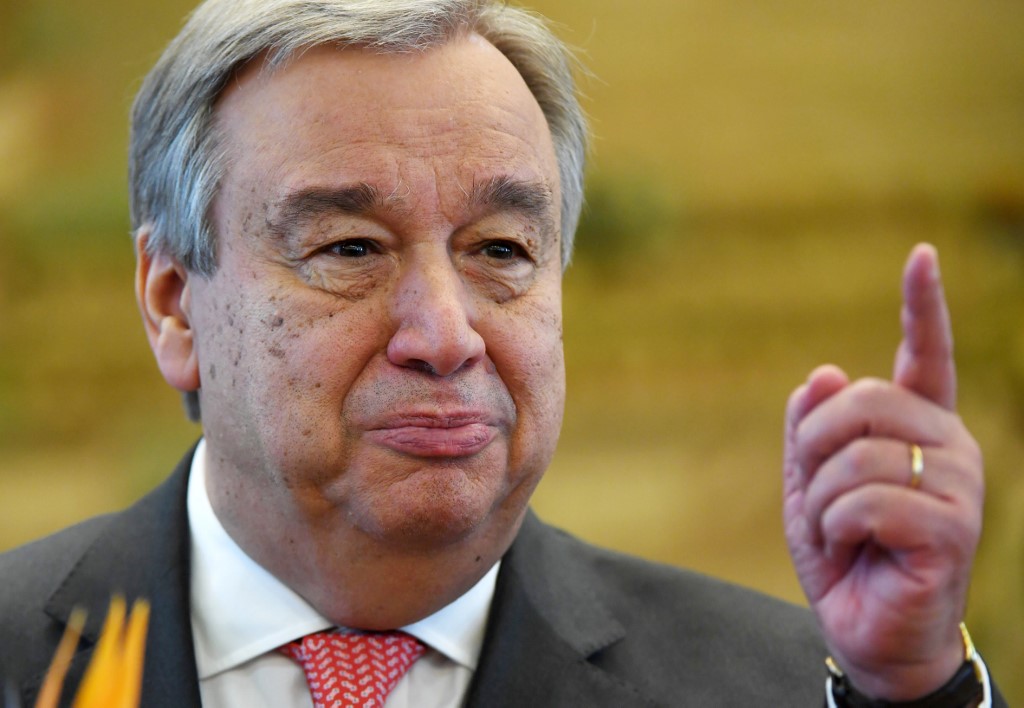Growing US-China rivalry seen fueling UN paralysis amid virus crisis

In this file photo UN Secretary-General-designate Antonio Guterres speaks during a joint press briefing with China’s Foreign Minister Wang Yi in Beijing on November 28, 2016. – UN Secretary-General Antonio Guterres on May 27, 2020 bemoaned the failure to heed his call for a ceasefire in conflicts around the world to aid the fight against COVID-19. “A global ceasefire would create conditions for a stronger response to the pandemic and the delivery of humanitarian aid to the most vulnerable people,” he said. (Photo by Greg Baker / AFP)
UNITED NATIONS, United States — For nearly a decade, the UN Security Council has been frequently paralyzed by Russia’s obstinacy over the Syrian crisis. Today, however, it is the US-China rivalry that has infected a growing array of issues, according to officials and diplomats.
As recently as 2017, an understanding between Washington and Beijing allowed the United Nations on three occasions — involving separate sets of economic sanctions — to project international unity in the face of the North Korean nuclear threat.
Three years later, the COVID-19 pandemic has seen a ferocious competition erupt between the UN’s two main contributors, prompting the organization’s chief, Antonio Guterres, to bemoan a “lack of leadership” during the world’s worst crisis since 1945.
“Where we see power, we sometimes do not see the necessary leadership,” he said recently.
Even after more than two months of negotiations, the 15 Security Council members were unable to reach agreement on a resolution supporting a call from the UN secretary-general for a global cease-fire while the world battles the novel coronavirus.
The sole reason? US-Chinese differences over a passing mention in the draft resolution to the World Health Organization (WHO), with which President Donald Trump on Friday said he planned to sever ties.
Both UN officials and diplomats say the US-Chinese conflict seems to be spreading, leaving them increasingly pessimistic.
“The Security Council has been frozen for 45 years between 1945 and 1990, because of the Cold War,” one ambassador said, speaking on condition of anonymity. “The last thing we need is another Cold War that would freeze again the Security Council.”
“Importing bilateral disputes in the Council would be a disaster,” he said.
Added another ambassador: “We really shouldn’t enter in a new Cold War. But it doesn’t look very good at the moment,” whether regarding leadership, the pandemic or US-Chinese relations, three subjects “very closely tied to each other.”
Fragility and humility
At the UN, there is a sense of a dangerous drift into new and dysfunctional territory.
“In the past, when you had disagreements among members of the Council, it was compartmentalized,” said a UN official, speaking on grounds of anonymity. “So your adversary one day on a particular issue was your best ally the next day on another issue. What we see now is everything spilling over.
“So there are camps, or there are disagreements which just spill over from one issue to another,” the official said, clearly alluding to the situation in Hong Kong, where tough new Chinese security legislation has pitted the two leading permanent members of the UN against each other.
“The tensions between the US and China are really problematic” for the world body, meaning the Security Council is “not able to move forward on a range of things,” the official added.
Several ambassadors shared that view.
“There is a huge fracture in the global multilateral architecture right now. And it’s very serious,” said Olof Skoog, the European Union ambassador to the UN.
“We are witnessing a polarization in the Security Council,” said Ambassador Christoph Heusgen of Germany, currently a non-permanent member of the council, alluding to an ever more bitter volley of tweets being exchanged by the US and Chinese missions.
At a press conference Thursday, Guterres expressed his regret that the pandemic had not evoked a greater sense of humility from the big powers.
“If the present crisis shows something, it is our fragility. Collective fragility. When we are fragile, we should be humble. When we are humble, we should be united and in solidarity,” he said, in remarks directed to members of the Security Council.
He then made it abundantly clear that he had in mind the United States and China — which as permanent Security Council members enjoy the veto power that greatly magnifies their influence.
“I have never seen the Council’s work being paralyzed by (non-permanent) members,” he said.
For more news about the novel coronavirus click here.
What you need to know about Coronavirus.
For more information on COVID-19, call the DOH Hotline: (02) 86517800 local 1149/1150.
The Inquirer Foundation supports our healthcare frontliners and is still accepting cash donations to be deposited at Banco de Oro (BDO) current account #007960018860 or donate through PayMaya using this link.